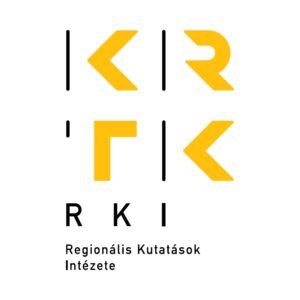Outstanding guest researcher in the Institute of Regional Studies

A new opportunity arose to invite prominent guest researchers to Hungary as part of the renewal program of the Academy’s research network. One of the six guest researchers, James Wesley Scott will participate in the scientific activities of the HAS Research Centre for Economic and Regional Studies for 10 months. Along with his hosting professional, Ilona Pálné Kovács and other members of the research team, they will examine the effects of Europeanisation and its consequences on Hungarian political culture and geopolitical thinking, the format and they way in which these appear in political public speech, in scientific research, and in background analyses of cross-border co-operation practices.
New space shaping forces and development paths in Eastern Europe

The South Transdanubian Research Institute submitted the winning project proposal titled „New space shaping forces and development paths in Eastern Europe at the dawn of the 21st century” in the framework of the large-scale project of OTKA. The objective of the research whose duration is from September 2012 to December 2015 is the modelisation of regional development paths, detecting the regularities of space shaping processes, and the elaboration of new theories of regional science. Project leader: Gyula Horváth.
„For the Nation” Award to the Institute of Regional Studies

The Foundation for the Cross-border Hungarian Ethnic Minority granted the „For the Nation” Award to the Institute of Regional Studies for taking care of the Regions of the Carpathian Basin series, the organisation of the cross-border Hungarian regional scientific workshops and their programmed management, and for the outstanding results achieved in the training of regional scientific researchers in the Carpathian Basin.
László Faragó Director of the Institute of Regional Studies

With the approval of the President of the Hungarian Academy of Sciences the Director General of the of HAS Research Centre for Economic and Regional Studies appointed former Deputy Director László Faragó Senior Research Fellow Commissioned Director of the Institute of Regional Studies as of May 16, 2012.
The Director of the Institute of Regional Studies resigned

Former Director Gyula Horváth submitted his resignation. The Director General of the HAS Research Centre for Economic and Regional Studies accepted the resignation and released him from his post as of May 15, 2012. The reason of his resignation, which Gyula Horváth explained in detail in a note addressed to the Director General was that he represented a view about the strategy of the organisation of the new research centre relying on an efficient practice of the network control of the Centre for Regional Studies opposing that of the Commissioned Director General.
Budapest Agglomeration Conference, April 26, 2012

A professional conference was held in the Ceremonial hall of the New City Hall about the possible cooperation between the capital city and its agglomeration, the common problems, the relationship between Budapest and the surrounding settlements on the 26th of April, 2012. The Budapest Agglomeration Conference was organised by the Municipality of Budapest Capital City in collaboration with the Institute of Regional Studies of the HAS Research Centre for Economic and Regional Studies. The conference publication and the presentations can be accessed on the web page of the event.
László Hrubi 1952–2012

The Institute of Regional Studies regrets to inform with grief and great sorrow the sudden demise of László Hrubi, research fellow of the Institute of Regional Studies on the 20th of March. Our Colleague has taken an active part in regional research since 1974, has been a dedicated professor of regional economics at the Faculty of Economics of the Pécs University of Sciences and conducted numerous South Transdanubian regional development programmes. The funeral of László Hrubi will take place on March 30, Friday, at 12.30 p.m. in the Pécs-Vasas cemetery.
Academic reform – the birth of the HAS’s Research Centre for Economic and Regional Studies

The Centre for Regional Studies was dissolved on the 31th of December, 2011 and as a member of the Hungarian Academy of Sciences Research Centre for Economic and Regional Studies it has been operating from the 1st of January, 2012 under the name of Institute of Regional Studies. The new organisational order will hopefully contribute to the efficiency of spatial and settlement development research. We are indebted to several institutions, organisations and professionals for their support of the development of regional science. The distinctive attention given to our activities was and remains an important motivating force for us. I sincerely hope that our new research results will further strengthen the international competitiveness of Hungarian regional science and contribute to the favourable change of the Hungarian spatial structure. In hopes of the realisation of all this, I wish all our readers interested in the results of regional science a successful new year. Gyula Horváth Director.
NYUTI (WHRI) is 25 years old

The West Hungarian Institute of the CRS of the MTA held its ceremonial session titled „Knowledge- Space- Society” on the 1st of December, 2011 on the occasion of its 25th anniversary. The Jubilee Volume issued on the occasion of the anniversary was presented during the event and two awards were granted
INNOAXIS – The borderline as an axis of innovation

The final conference of the Serbian-Hungarian IPA project called “INNOAXIS – The borderline as an axis of innovation” was organised by the Centre for Regional Studies, Hungarian Academy of Sciences (MTA RKK) – as the lead partner of the project – with cooperation of the Regional Scientific Association (RTT) and the Local Government of Mórahalom. This important event of the project was held in Baja on 19th July 2011. The main aim of the conference was to introduce the prepared documents: the Economic Operative Program and the Human Operative Program. The professional lectures also presented at the conference revealed the developmental and cooperation opportunities of the border regions.


